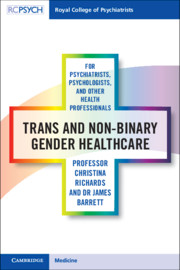Book contents
- Trans and Non-binary Gender Healthcare for Psychiatrists, Psychologists, and Other Health Professionals
- Reviews
- Trans and Non-binary Gender Healthcare for Psychiatrists, Psychologists, and Other Health Professionals
- Copyright page
- Contents
- Acknowledgements
- Author Biographies
- Chapter 1 Introduction to Gender Diversity
- Chapter 2 Assessment
- Chapter 3 Physical Treatments for Trans People and Their Interactions with Psychiatric Treatments
- Chapter 4 Mental Health Conditions
- Chapter 5 Supporting Trans and Non-binary People in Mental Health Services
- Chapter 6 Supporting Trans and Non-binary People in Forensic Settings
- Chapter 7 Autistic Spectrum Conditions and Intellectual Disability
- Chapter 8 Sexuality, Relationships, and Reproduction
- Chapter 9 Legal and Religious Aspects
- Chapter 10 Psychotherapy
- Index
- References
Chapter 7 - Autistic Spectrum Conditions and Intellectual Disability
Published online by Cambridge University Press: 18 August 2020
- Trans and Non-binary Gender Healthcare for Psychiatrists, Psychologists, and Other Health Professionals
- Reviews
- Trans and Non-binary Gender Healthcare for Psychiatrists, Psychologists, and Other Health Professionals
- Copyright page
- Contents
- Acknowledgements
- Author Biographies
- Chapter 1 Introduction to Gender Diversity
- Chapter 2 Assessment
- Chapter 3 Physical Treatments for Trans People and Their Interactions with Psychiatric Treatments
- Chapter 4 Mental Health Conditions
- Chapter 5 Supporting Trans and Non-binary People in Mental Health Services
- Chapter 6 Supporting Trans and Non-binary People in Forensic Settings
- Chapter 7 Autistic Spectrum Conditions and Intellectual Disability
- Chapter 8 Sexuality, Relationships, and Reproduction
- Chapter 9 Legal and Religious Aspects
- Chapter 10 Psychotherapy
- Index
- References
Summary
The autistic spectrum conditions, disorders, or diversity (ASC), which used to be known as Asperger’s syndrome and autism, are in this chapter considered in tandem with intellectual disability (ID). While there are, of course, notable differences between the groups, we decided that for ease of reading, it was reasonable to consider all these conditions here. While we would not wish to elide them altogether, there has been some practical cross-over in some instances. It is notable that as the frequency of ASC diagnosis has risen, a proportionate decrease in diagnoses of mild ID has occurred. It’s notable also that until quite recently, ASC was a purely paediatric diagnosis, with the assumption on the part of statutory care and other services that when children with Asperger’s syndrome or autism passed the age of majority, they experienced an abrupt and overnight resolution. In fact, and totally unsurprisingly, children with ASC simply turn into adults with ASC, formally diagnosed or not. The only caveat is that trans boys – that is, those who are assigned female at birth but with a male identity – often like playing with mechanical toys, are less pro-social than their [cisgender] female peers, and can be socially isolated (because they seem like an ‘odd’ girl). They can look very much like a girl with ASC but are, in fact, typical of a [neurotypical, trans] boy.
- Type
- Chapter
- Information
- Trans and Non-binary Gender Healthcare for Psychiatrists, Psychologists, and Other Health Professionals , pp. 70 - 80Publisher: Cambridge University PressPrint publication year: 2020

